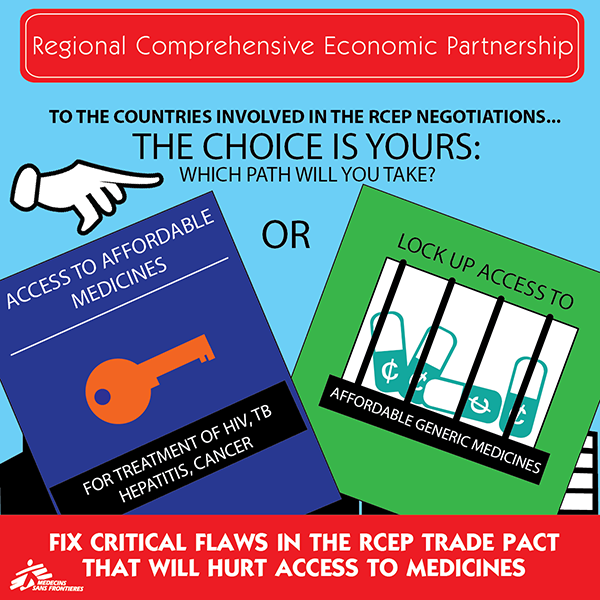MSF calls on Japan and South Korea to drop the harmful RCEP measures

MSF | 22 February 2017
MSF calls on Japan and South Korea to drop the harmful RCEP measures
Kobe, Japan/New Delhi: As 16 countries negotiating the Regional Comprehensive Economic Partnership (RCEP)agreement meet next week in Kobe, Japan, for the seventeenth round of negotiations, international medical humanitarian organisation Médecins Sans Frontières (MSF) is appealing tothe Japanese and South Korean governmentsto withdraw harmful proposals that will restrict people’s access to affordable generic medicines. While being negotiated behind closed-doors, Japan and South Korea are aggressively pushing for measures in the RCEP agreement that would emphasise stronger pharmaceutical corporation power at the expense of public health, threatening millions of lives globally.
“Japan has beenadvocating for the need to address high drug prices and the need for access to affordable treatment at the UN and G7; butthe tougher intellectual property provisions it has been negotiating for in RCEP go against that,”saidJeremie Bodin, General Director, MSF Japan. “One of the proposals would lengthen patent monopolies that willlead to unaffordable drug prices for a longer time,while also underminingfragilehealth care systemsand stiflingthe patient-centred research and development required to address emerging public health challenges.”
The intellectual property provisions initiated by Japan and South Korea go far beyond the requirements needed under international trade rules. The proposed provisions seek to extend pharmaceutical corporations’ patent terms beyond the usual 20 years, and also would require data exclusivity that limits competition – even for improved formulations of older medicines that do not deserve a patent. Equally disturbing is the proposed investment chapter which raises the risks of the Indian and ASEAN governments being sued by pharmaceutical corporations for millions of dollars in secret tribunal – outside of domestic courts for regulating the IP system and controlling drug prices in public interest. All of these provisions are similar to those included in the Trans Pacific Partnership (TPP) trade agreement, which MSF and many others branded as the worst trade deal ever for access to medicines.
“The worst intellectual property provisions of theTPP have been introduced through the backdoor by Japan in the RCEP negotiations. Measures like patent term extensions and data exclusivity are another form of ‘evergreening’monopolies on older medicines, which allows a deadly delayto the introduction of generic competitionand expand the power of pharmaceutical corporations to charge exorbitantprices,” said Leena Menghaney, Head-South Asia, MSF Access Campaign.“The RCEP negotiators must protect existing public health safeguards that enable developing countries like India to keep supplying the life-saving affordable medicines needed to treat millions of people worldwide.”
Today, mounting prices of medicines under monopoly are already straining the budgets of governments around the world, and leaving treatment providers like MSF and people without access, including in high-income countries. In 2001, pharmaceutical corporations charged more than US$10,000 per year to treat one person living with HIV – even as countries like South Africa were witnessing over 500 deaths a day from the AIDS epidemic. In this decade prices have passed $100,000 per person for new cancer therapies, and $1,000 a pill in some countries for hepatitis C drugs. The recent report of the U.N. Secretary General’s High Level Panel on Access to Medicines recommended that governments engaged in bilateral and regional trade and investment treaties should ensure that these agreements do not include intellectual propertyor investment provisions that interfere with their obligations to fulfil people’s right to health.
“In our projects in South Africa, we already witness the human consequences of price hikes of medicines used in the treatment of drug resistant TB and HIV for reasons of politics and profit”, said Dr. Amir Shroufi, MSF South Africa Medical Coordinator.“Accepting stringent intellectual property measures in trade deals like RCEP will result in a further narrowing of access to the affordable, quality generic medicines that MSF relies on to treat people across the world.”





